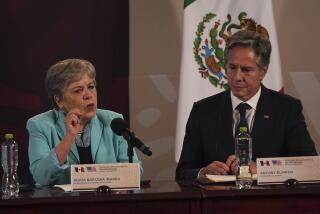Mexico, IMF Reported Near Debt Accord : Program Would Stress Economic Growth Rather Than Austerity
- Share via
WASHINGTON — Mexico and the International Monetary Fund are “getting very close” to a firm agreement on an economic program to solve Mexico’s debt crisis through growth instead of austerity, a senior Reagan Administration official said Tuesday.
Under the plan, hammered out during weekend talks here between Mexican Finance Minister Gustavo Petricioli and top IMF officials, the fund has moved significantly closer to accepting Mexico’s demand that its economy be allowed to grow at 3% to 4% a year and that its depressed oil revenues be taken into account, the official said.
After a meeting early Tuesday with Treasury Secretary James A. Baker III, Petricioli returned to Mexico City to report to President Miguel de la Madrid. If the Mexican leader approves of the broad lines of the agreement worked out here, a letter of intent addressed to the IMF may be prepared as early as next week, fund sources said.
“Things are going well,” said a source in De la Madrid’s office. “We believe that, at last, the IMF and bankers understand that oil prices must be taken into consideration.” The source declined to detail the shape a new agreement would take.
But officials close to the negotiations cautioned that many details need to be worked out involving the economic reform program that Mexico must implement as a condition for $1.5 billion in additional IMF loans sought over the next 18 months.
Equally important, officials said, is the fact that the commercial banks from which Mexico needs up to $3.5 billion over the same period have not yet signed on.
“They’re getting closer, but there is not a firm agreement,” said the senior official, who spoke on condition that he not be identified. “But you still have the private banks that have to be negotiated with before you have agreement. The one thing you don’t have is the private banks committing new money against economic reforms.”
A Sign of Confidence
However, as a sign of IMF confidence in the progress made last weekend, IMF Deputy Manager Richard Erb is to accompany Angel Gurria, a key Mexican central bank negotiator, to talks today in New York with the main U.S. commercial bank creditors.
Mexico’s total debt burden is about $97.6 billion. And, with the collapse this year of oil revenues--from which Mexico derives 60% to 70% of its total earnings--interest payments have become impossible to meet without further financing.
In addition to the IMF and bank loans, Mexico is negotiating for another $1.2 billion from the World Bank and the Inter-American Development Bank. In all, the rescue package needed to tide the country over for the next 18 months or so is likely to reach as much as $8 billion.
The Administration official was clearly pleased that the Mexico-IMF negotiations have developed along the lines of the so-called Baker plan for dealing with the Third World debt problem. That plan, presented at the IMF meeting in Seoul, South Korea, last September, urged that economic reform conditions be oriented toward growth, rather than the more traditional austerity programs imposed in the past.
Keyed to Oil Prices
In the Mexico-IMF negotiations, “you have the fund moving in a growth-oriented direction,” the official said. “You have consideration of (economic) performance targets that are keyed to the price of oil--that is, to the extent of growth in the country.”
Linking either debt service or future loan commitments to Mexico’s ability to collect revenues from petroleum--in an oil market that has wiped out more than half of the country’s prospective oil earnings this year alone--has been a key Mexican demand in the IMF talks.
A Western diplomat in Mexico City called the possible agreement on such linkage an “innovative approach.”
First, he said, the IMF and Mexico would project oil prices over the length of the agreement and base Mexico’s current borrowing needs on that price. Should the price of petroleum fall below the projected levels during the life of the agreement, the IMF would arrange for new loans to make up the shortfall. Such an arrangement would presumably shelter Mexico from further, unforeseen drops in oil revenues.
In addition, the source said, any increase in government budget deficits that result solely from reduced petroleum earnings would not be punished by the IMF. In the past, the IMF has been quick to condemn Mexican budget deficits and to shut off loans from creditors when the Mexican government missed spending targets.
If oil prices should recover, according to the formula, fewer loans would be necessary, and Mexico could even begin repaying some debt.
Times staff writer Dan Williams, in Mexico City, contributed to this article.
More to Read
Sign up for Essential California
The most important California stories and recommendations in your inbox every morning.
You may occasionally receive promotional content from the Los Angeles Times.












